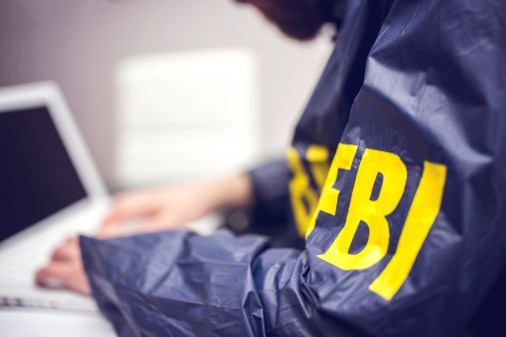FBI’s ‘Shark Tank’ — bureau turns to field agents for mobile innovation
The FBI is looking to field agents — and a reality TV show format — to help develop the newest mobile technologies to support their mission.
Hoping to keep up with the pace of technology development, the bureau is focusing on efforts that enable frontline personnel to drive innovation, according to Kevin Tunks, product development and mobile strategy lead in the FBI’s mobile technology office.
One of those enablers came to Tunks and his team straight from the television. They use a “Shark Tank” pitch meeting model to spur internal innovation, he said Thursday at a Bloomberg Government event. Just like the popular ABC television show, the FBI program lets people with big ideas — in this case field agents — pitch their ideas for mobile applications to a board of executives and other stakeholders. But unlike the “sharks” on the show, the FBI team uses the model because they “don’t have a lot of development budget.”
After the pitch, “as long as everybody [on the board] nods yes, or doesn’t say no, it moves forward,” Tunks said, though he didn’t comment on the funding process once the ideas are approved. The agents have 60 days to move their ideas into prototypes, he said.
“Worst case scenario, we’ve lost 60 days of somebody’s time,” Tunks said. “Best case scenario, we’ve gotten a really transformational product out of a group of people … the people who really do the mission that are creating a solution for themselves.”
So far, the concept has resulted in “10-plus apps,” he said, which have been received well in the field, “because it was built by the field, it was built for the field.”
Tunks, who explained his role as taking the 30,000 Android phones the FBI bought earlier this year “beyond just email … to build custom and internal apps that really unlock new business processes,” said the bureau is depending more on field agents, whether they’re IT experts or amateur mobile hobbyists who serve the bureau in some other capacity, to help develop, test and adopt mobile applications in the environments in which they’re meant to be used.
“We really have turned a lot over to the field,” Tunks said. “Our moniker is ‘How can we do IT at mission speed?'”
“We focus our small energies on being able to create platforms … and really leveraging our own internal resources to do things,” he added.
Sometimes that means developing more effective governance so agents can follow latest industry practices, he said, and sometimes that’s “building the underlying components that allow people to really build on top of so that they’re just doing that top of the iceberg, the piece that’s above the waterline … that is so unique and special to what they do.”
Although this model is less dependent on industry for outsourced development, Tunks believes there’s still plenty the two can partner on.
“Where there’s tremendous value in the private sector is there’s so many use cases for mobile that aren’t” mission related, he said, reasoning that back office tasks, like manual sign-in sheets and accounting processes, that aren’t the expertise of the FBI can be outsourced to private industry to preform in an IT-enabled, mobile fashion. “Any of the sort of back office things that are common to many different agencies, I think that’s where industry can take itself to build capabilities that frankly I don’t want to have to build. I want our guys to focus on tactical mission stuff, not HR or financial stuff.”






